Lost Connections: Rethinking the causes and treatments of depression
Mar 19, 2022 · 4 mins read
0
Share

Depression isn’t just chemical
Journalist Johann Hari began researching the nature of depression after taking higher and higher doses of antidepressants for a decade without any improvement. Here’s what he found, as documented in his bestselling book Lost Connections.
Save
Share
How antidepressants work (and whether they work at all) is debated among scientists. Some believe that placebos play a big role in treatment. Others maintain that there’s no clinical basis for the theory that depression is caused by lowered levels of serotonin in the brain.
Save
Share
Hari believes that most studies on antidepressants are skewed by the interests of big pharma. Antidepressants may form part of a solution for some (in cases where the positives outweigh the side effects) but he thinks we need to look elsewhere for solutions.
Save
Share
Several studies have shown that environmental factors (rather than brain chemistry) could be responsible for depression, i.e. it could just be a response to adversity. The problem with clinical treatment of depression, Hari says, is that it seems to omit this question of context.
Save
Share
Unsatisfied with the medical industry’s explanation of depression, Hari addresses what he believes are its ‘true’ social and psychological causes. The common denominator is disconnection – most prominently from meaningful work.
Save
Share
Another cause of depression is societal change. We used to live among communities in which we shared our lives with our physical neighbors. These days, however, most people’s idea of ‘home’ has shrunk to the four walls of their own house.
Save
Share
Loneliness has been shown to negatively impact our brains. But simply being around others doesn’t solve the problem. Genuine connection requires a two-way interaction that’s meaningful for both sides. The internet doesn’t offer this, as it’s merely a ‘parody’ of true connection.
Save
Share
Consumerism has contributed to rising depression, as its core value is that owning more things makes you happier. But materialism worsens relationships. You worry more about being judged. And some of your basic human needs, like making a difference to the world, go unmet.
Save
Share
Another possible cause? The Adverse Childhood Experiences Study found that higher reports of childhood trauma led to a higher likelihood of depression. Hari thinks this is because kids tend to believe that abuse is their fault. That’s a damaging perception to take into adulthood.
Save
Share
Social status may be an overlooked factor. Studies of primates show that low-status members of groups display signs of depression and higher cortisol levels, which are related to stress. It’s no surprise, then, that people lacking wealth, beauty or fame experience depression.
Save
Share
0